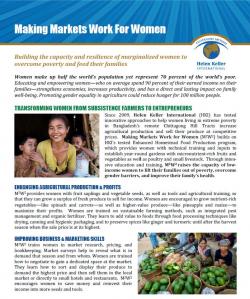From Darkness and Despair to a Life of Hope
Dhanalata Chakma is a mother of three girls in central the Chittagong Hills Tracts in Bangladesh. This region is home to ethnic and religious minorities that are among the most disenfranchised in the country. Most do not own land and have limited access to ethnic majority-controlled markets, agricultural training, and health services.
When we met Dhanalata five years ago, she and her husband were barely surviving on day labor wages. They could not feed their children or buy them clothes for school. “My family was living in darkness and total despair,” she recalls. At times, Dhanalata contemplated suicide.
On joining Helen Keller International’s Making Markets Work for Women program, Dhanalata received training in sustainable agriculture practices, nutrition education and a generous supply of seeds to get her own garden started. She built a vegetable and pumpkin garden next to her house and, by the end of the season, had enough to feed her family every day.
She also has enough surplus to sell at the market. Her profits from that first season enabled her to secure a mortgage on 40% of the land, purchase enough tin for a roof, and more seed to expand her home garden. With continued support and agricultural education through the program, Dhanalata and her husband continued to expand, planting in additional fields and enjoying a vastly improved quality of life. “The neighbors all look at our gardens when they pass by the road,” she said proudly. “They are amazed and are interested in making their own gardens.”
Dhanalata no longer works as a day laborer, focusing her time on cultivating her land and selling her vegetables. Her business now also includes raising and selling chickens and eggs. “I have admitted my children to school and can afford to buy clothes for them. I feel very fortunate and mentally at peace with the change in our present.”
Learn more about this incredible program and how it is helping empower thousands of marginalized women in Bangladesh to build financial independence and better lives for themselves and their families.










